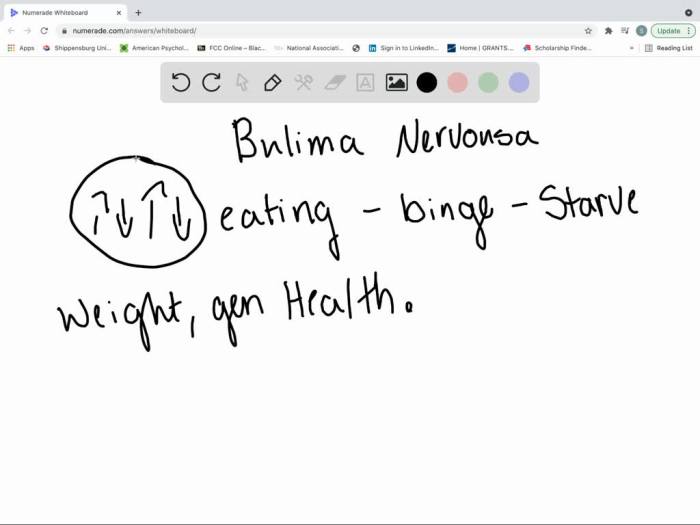Which of the following statements about anorexia nervosa is true? This question delves into the complex and multifaceted nature of an eating disorder that has profound physical and psychological consequences. Anorexia nervosa, characterized by an intense fear of gaining weight and a distorted body image, is a severe mental illness that requires specialized treatment and support.
This comprehensive guide will explore the key characteristics, causes, health consequences, treatment options, and recovery strategies associated with anorexia nervosa. By shedding light on this complex disorder, we aim to empower individuals with the knowledge and resources they need to make informed decisions about their health and well-being.
Anorexia Nervosa Characteristics
Anorexia nervosa is an eating disorder characterized by an intense fear of gaining weight, an unhealthy desire to be thin, and a distorted body image. Individuals with anorexia nervosa may severely restrict their food intake, engage in excessive exercise, and use other methods to lose weight.
Key psychological characteristics of anorexia nervosa include:
- Intense fear of gaining weight or becoming fat
- Distorted body image, seeing oneself as overweight even when underweight
- Denial of the seriousness of the illness
- Perfectionism and high self-expectations
Physical manifestations of anorexia nervosa can include:
- Extreme weight loss
- Malnutrition and vitamin deficiencies
- Amenorrhea (loss of menstrual periods in women)
- Brittle hair and nails
- Dry skin
- Slow heart rate and low blood pressure
The diagnostic criteria for anorexia nervosa, according to the Diagnostic and Statistical Manual of Mental Disorders (DSM-5), include:
- Restriction of energy intake leading to significantly low body weight
- Intense fear of gaining weight or becoming fat
- Disturbance in the way one’s body weight or shape is experienced
- Amenorrhea in women
Causes and Risk Factors of Anorexia Nervosa
The exact cause of anorexia nervosa is unknown, but it is believed to be a complex interaction of psychological, social, and biological factors.
Psychological Factors
- Low self-esteem and negative body image
- Perfectionism and high expectations
- Anxiety and depression
- History of trauma or abuse
Social Factors
- Cultural emphasis on thinness
- Peer pressure and bullying
- Family conflict or dysfunction
Biological Factors
- Genetic predisposition
- Neurochemical imbalances
- Hormonal changes
Risk factors for anorexia nervosa include:
- Female gender
- Adolescence or young adulthood
- Family history of eating disorders
- History of dieting or weight loss attempts
- Participation in certain sports or activities that emphasize thinness
Health Consequences of Anorexia Nervosa: Which Of The Following Statements About Anorexia Nervosa Is True

Anorexia nervosa can have severe and life-threatening health consequences. Short-term effects include:
- Malnutrition
- Vitamin and mineral deficiencies
- Electrolyte imbalances
- Cardiac arrhythmias
- Gastrointestinal problems
- Kidney damage
- Bone loss
Long-term effects can include:
- Infertility
- Osteoporosis
- Heart failure
- Kidney failure
- Brain damage
- Death
Anorexia nervosa has the highest mortality rate of any mental illness.
Treatment Options for Anorexia Nervosa

Treatment for anorexia nervosa typically involves a multidisciplinary approach that includes psychotherapy, medication, and nutritional support.
Psychotherapy
- Cognitive-behavioral therapy (CBT) focuses on changing negative thoughts and behaviors related to eating and body image.
- Family-based therapy (FBT) involves the family in the treatment process, helping to improve communication and support.
- Interpersonal psychotherapy (IPT) focuses on improving social relationships and resolving conflicts.
Medication
- Antidepressants can help to reduce anxiety and depression, which are often associated with anorexia nervosa.
- Antipsychotics can help to reduce obsessive thoughts and behaviors.
Nutritional Support, Which of the following statements about anorexia nervosa is true
- Medical monitoring and nutritional counseling are essential to ensure that individuals with anorexia nervosa receive adequate nutrition and prevent further weight loss.
- In severe cases, hospitalization may be necessary to provide intensive medical care and nutritional support.
Recovery and Prevention of Anorexia Nervosa

Recovery from anorexia nervosa is a complex and challenging process that requires commitment and support. It is important to address both the psychological and physical aspects of the illness.
Strategies for preventing the onset or relapse of anorexia nervosa include:
- Education about eating disorders and healthy eating habits
- Early intervention and treatment for eating disorders
- Community support and resources for individuals with eating disorders and their families
Resources and support networks for individuals struggling with anorexia nervosa include:
- National Eating Disorders Association (NEDA): https://www.nationaleatingdisorders.org
- Anorexia Nervosa and Associated Disorders (ANAD): https://anad.org
- National Suicide Prevention Lifeline: 1-800-273-8255
Questions Often Asked
What are the key characteristics of anorexia nervosa?
Anorexia nervosa is characterized by an intense fear of gaining weight, a distorted body image, and severe food restriction. Individuals with anorexia may engage in excessive exercise, purging behaviors (such as vomiting or laxative use), and have a preoccupation with body weight and shape.
What are the causes of anorexia nervosa?
The exact causes of anorexia nervosa are not fully understood, but it is believed to be influenced by a combination of genetic, psychological, and environmental factors. Risk factors include a family history of eating disorders, certain personality traits, and exposure to societal pressures related to body image.
What are the health consequences of anorexia nervosa?
Anorexia nervosa can have severe health consequences, including malnutrition, organ damage, and mental health issues. Prolonged starvation can lead to electrolyte imbalances, heart problems, kidney failure, and even death.
What are the treatment options for anorexia nervosa?
Treatment for anorexia nervosa typically involves a multidisciplinary approach, including psychotherapy, nutritional support, and medication. Psychotherapy focuses on addressing the underlying psychological issues that contribute to the disorder, while nutritional support aims to restore a healthy weight and prevent further complications.
What are the challenges of recovery from anorexia nervosa?
Recovery from anorexia nervosa can be a challenging process, often involving setbacks and relapses. Individuals may struggle with body image issues, disordered eating patterns, and emotional dysregulation. Support from family, friends, and professionals is crucial for successful recovery.